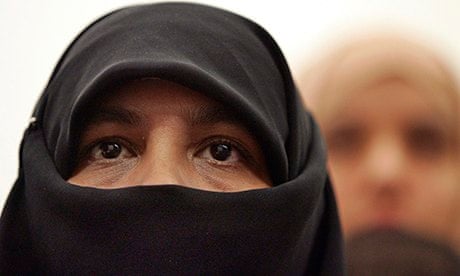The most senior judge in England and Wales hasdisclosed plans to launch a consultation on whether veils can be worn in court as he warned the issue had become highly divisive.
At his first press conference since taking up his judicial post last month, the lord chief justice, Lord Thomas of Cwmgiedd, also suggested that in future criminal defendants might be able to take part in preliminary hearings from home via Skype or FaceTime video systems on their computers.
The former justice secretary, Ken Clarke, at the weekend stirred the controversy over the niqab by declaring that a fair trial could not take place if a defendant is "in a kind of bag". In September, a judge ruled a Muslim woman would be allowed to stand trial while wearing a full-face veil but said she must remove it while giving evidence.
Thomas said: "The best way for dealing with this matter is to make a practice direction … The basic principle will be that it must be for the judge in any case to make his own or her own decision but we will give clear guidance.
" We hope to be able to issue a draft for consultation in the very near future… But we shall look forward to all your assistance in trying to reach the right answer to what is without doubt a problem that many people found divisive.
"I regard it as the responsibility of the senior judiciary to give guidance and it will be guidance that is not merely, 'Well, it all depends,' but starting from a clear starting point giving fairly reasonable guidance as to what should happen. What we intend to do is put that out to public consultation and then finalise it."
Thomas said using Skype or FaceTime would be an "innovative" way of reducing court costs. The Ministry of Justice has pencilled in a saving of £200m through restructuring the HM Courts and Tribunals Service.
Asked if spending cuts meant the sale of more court buildings, he said: "No I don't think it does mean selling off buildings.
"There are innovative ways of actually providing open justice bearing in mind things such as Skype and Facetime … I'm very keen we should because most of what happens in court you don't have problems with security and we can be much more open to use of Skype and Facetime than we traditionally have been." The lord chief justice continued: "A lot of the difficulties we have … is that to make a court case work well you need a pre-trial hearing, but it is often very expensive to get a prisoner or a person who is out on bail to come to court, to get the lawyers to come to court, and I think a lot of this can be solved by the use of technology.,
"CCTV, especially dedicated, is very expensive and one of the difficulties we had is instead of using cheap technology, we go in for over-engineered solutions, supposedly mandated by security concerns."
Asked if he envisaged defendants appearing from home, he said: "I can see it happening for pre-trial hearings – whether one could go any further would depend – but certainly pre-trial hearing stage is one place we have to make changes.
"We have to look at solutions that are innovative and will bring down the cost of litigation because we can't afford to go on as we once did."
